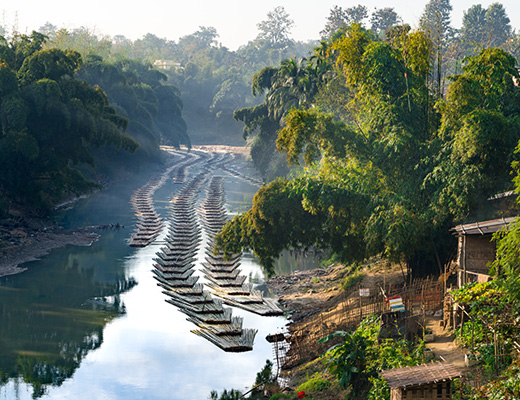Mizoram
In Mizoram, 85.41% of the total geographical area is covered by forests, of which Bamboo forests cover 3,267 sq. kms.


Introduction

Mizoram is one of the seven states in the northeast. Mizoram shares its borders with other northeast states like Manipur, Tripura, and Assam as well as with neighboring countries of Bangladesh and Myanmar.
Industries in the state enjoy a unique location-specific advantage. Bordering Myanmar and Bangladesh, Mizoram offers a gateway for engaging in international trade with Southeast Asian countries. With improving road, rail and air connectivity and the establishment of trade routes with neighbouring countries, trade facilitation has improved over the last decade.
At current prices, the gross state domestic product (GSDP) of Mizoram reached Rs. 278.23 billion (US$ 3.67 billion) in 2021-22. The state’s GSDP (in Rs.) increased at a CAGR of 10.67% between 2015-16 and 2021-22.
At current prices, the net state domestic product (NSDP) of Mizoram reached Rs. 242.93 billion (US$ 3.31 billion) in 2021-22. The state’s NSDP (in Rs.) increased at a CAGR of 10.16% between 2015-16 and 2021-22.
Bamboo forests cover 3,267 sq km of Mizoram’s geographical area. There is an estimated growing stock of 25.26 million metric tonnes (MMT) of 35 varieties of bamboo in the state. It offers immense potential for the commercial exploitation of natural resources for export-oriented industries.
The climatic conditions in the state provide a conducive breeding ground for commercial exploitation of all kinds of silkworms. Sericulture remains one of the state's key industries. Raw silk production in Mizoram stood at 59 metric tonnes in FY22 and 84 MT in FY23.
Mizoram has the potential to generate 4,500 megawatts (MW) of hydropower. As of September 2023, Mizoram had a total installed power generation capacity of 265.35 MW, comprising hydro (97.94 MW), thermal (91.51 MW) and renewable energy sources (75.90 MW).
With a literacy rate of 91.33%, Mizoram offers a highly literate workforce. Knowledge of English is an added advantage for the Mizo workforce.
With improving road, rail and air connectivity and the establishment of trade routes with neighbouring countries, trade facilitation has improved over the last decade.
Key Sectors
- National Bamboo Development Agency has set up 8 bamboo handicraft clusters, 11 bamboo furniture clusters, 3 bamboo agarbatti clusters and 5 other bamboo clusters, to date, under the cluster development programme in the state.
- The state government allocated Rs. 79,301.33 lakh (US$ 95.96 million) for agriculture & allied activities under its annual budget 2023-24.
- As of 2021-22, the state has 545 sub-centres, 70 primary health centres, 9 community health centres, 2 sub-district hospitals, and 9 district hospitals.
- In the Union Budget 2022-23, the Indian government allocated Rs. 100 crore (US$ 13.10 million) for the construction of Bamboo Link roads at different locations in Mizoram.
- In FY21, the annual allocation in Mizoram to implement the ‘National Bamboo Mission’ stood at Rs. 70 million (US$ 0.95 million).
- Natural resources, climatic conditions, and policy incentives in the state support investment in bamboo, sericulture, tourism, agro-products and agro-processing sectors.
- In 2019, to promote brotherhood among Mizos across the globe, the State Government allocated Rs. 1 crore (US$ 0.14 million) to organise unity festivals.
- Total horticulture production in Mizoram was 687.36 thousand metric tonnes as per advance estimates for 2021-22. In FY20, the state produced 344.91 thousand tonnes of fruits under an area of 63.77 thousand hectares. Similarly, 101.49 thousand tonnes of spices were produced in the state under an area of 28.22 thousand hectares in FY20.
- Mizoram has 24,000 hectares of area that could be utilised for fish farming. Of this, just 5,507.04 hectares were developed as ponds and tanks until 2020-21. The state’s fish production stood at 4,304 MT in 2020-21.
- With its highly green hills, crisscrossing rivers, and interspersed lakes, Mizoram is a tourist’s paradise. In 2020, foreign tourist arrivals and domestic tourist visits in the state stood at 265 and 3,089, respectively. In August 2020, the Union Minister of State for Tourism, Mr. Prahlad Singh Patel, inaugurated the ‘Thenzawl Golf Resort project in Mizoram under the Swadesh Darshan Scheme.
FACTFILE
Capital
AizawlGeographical Area (sq km)
21,087State Language
Mizo and EnglishLiteracy Rate
91.33 per centKey Industries:
Bamboo
Sericulture
Energy
IT
Food processing
Agriculture
Tourism





